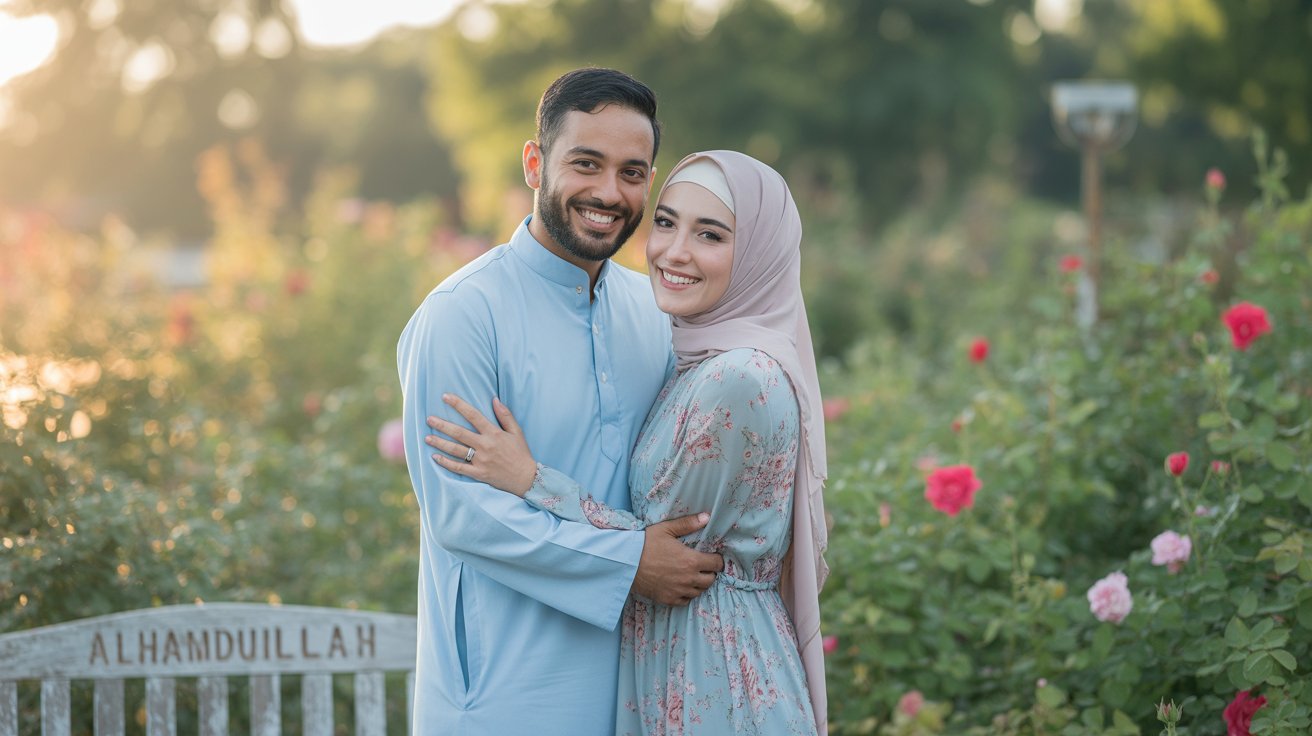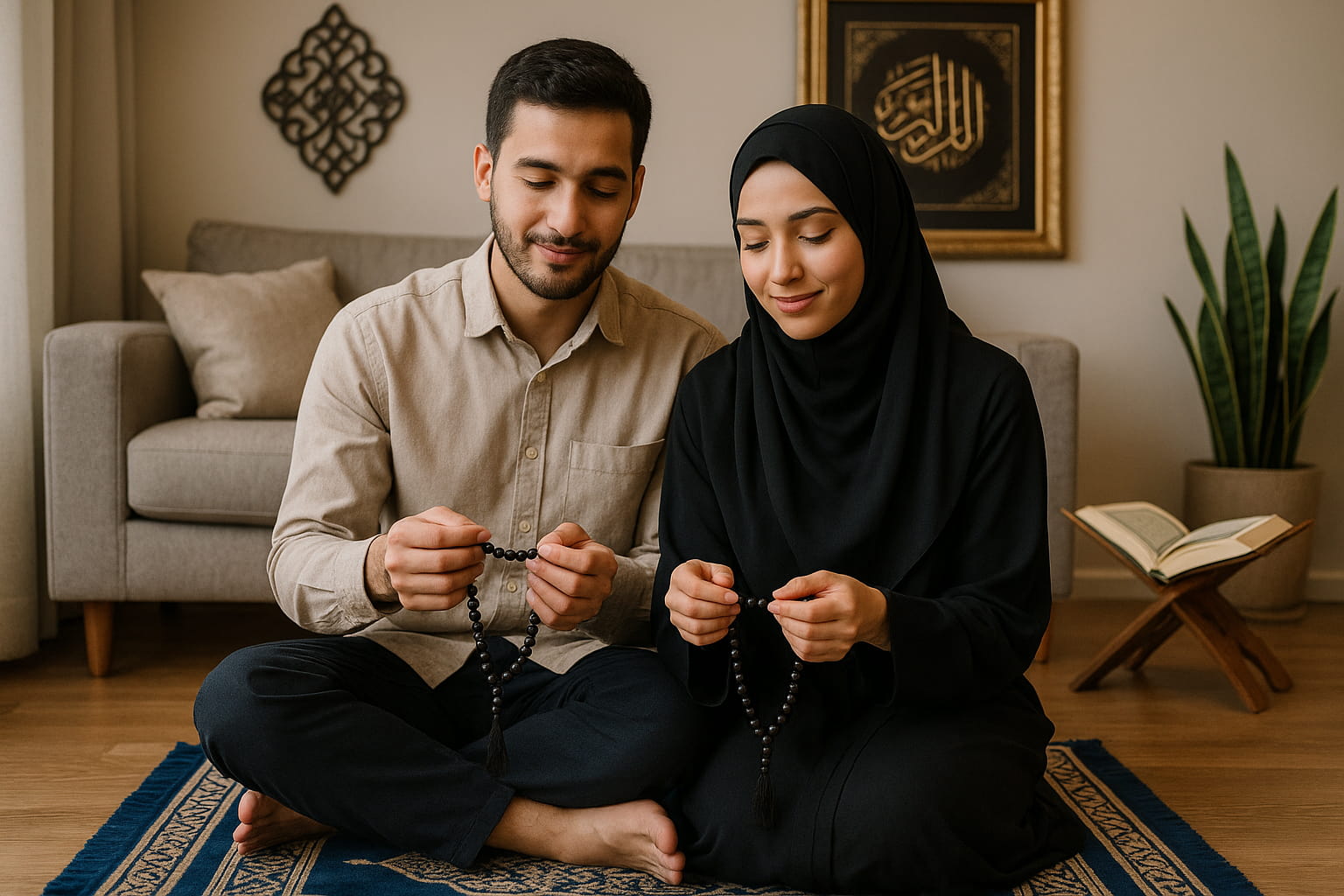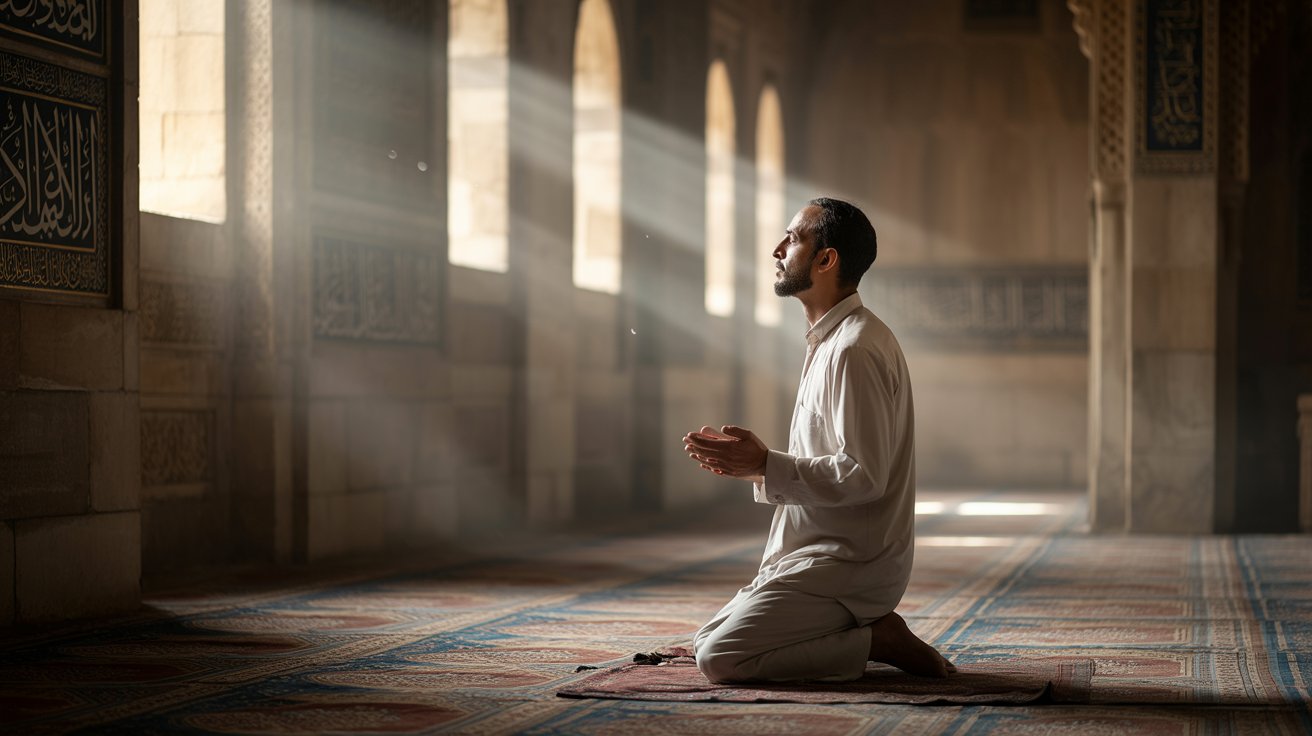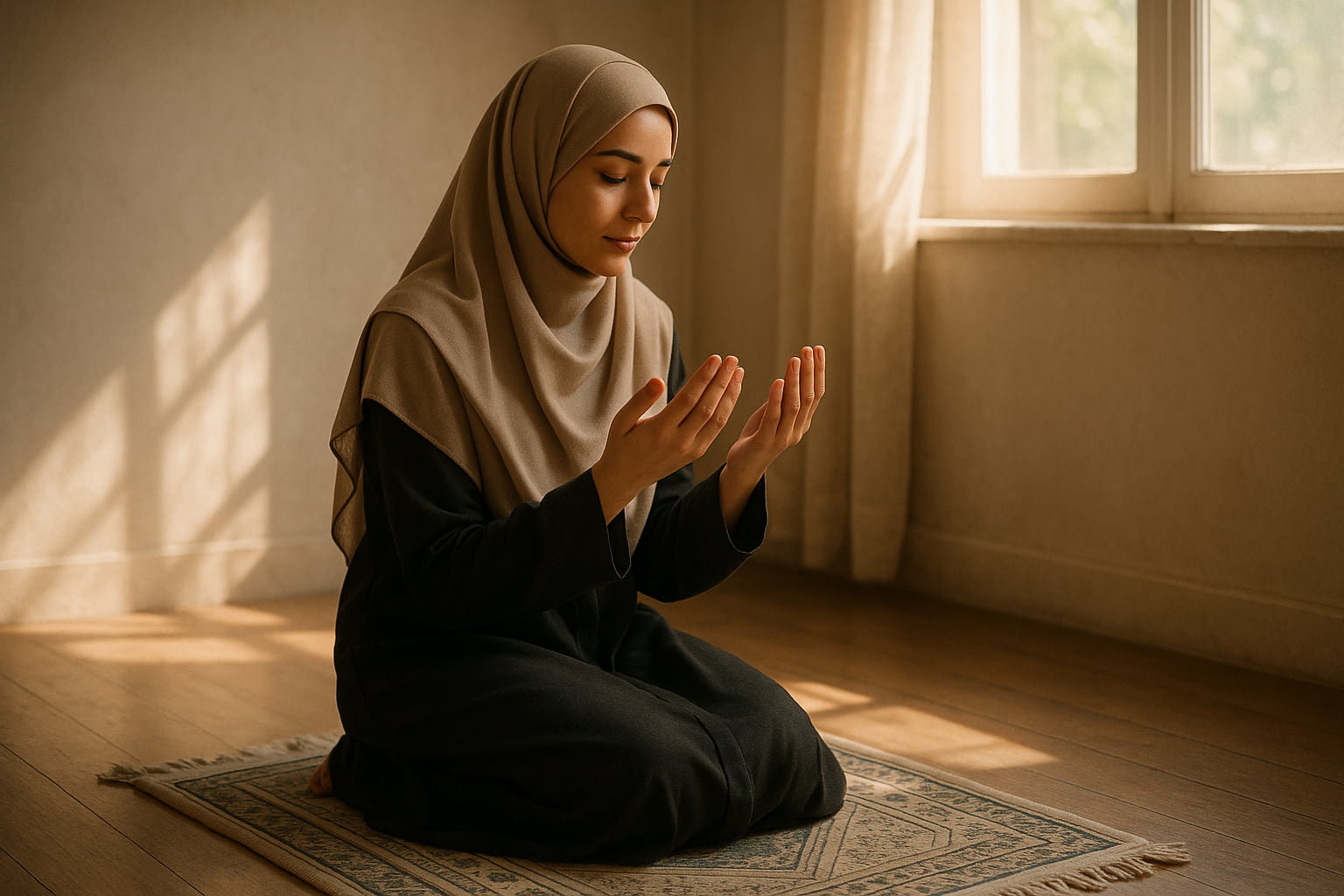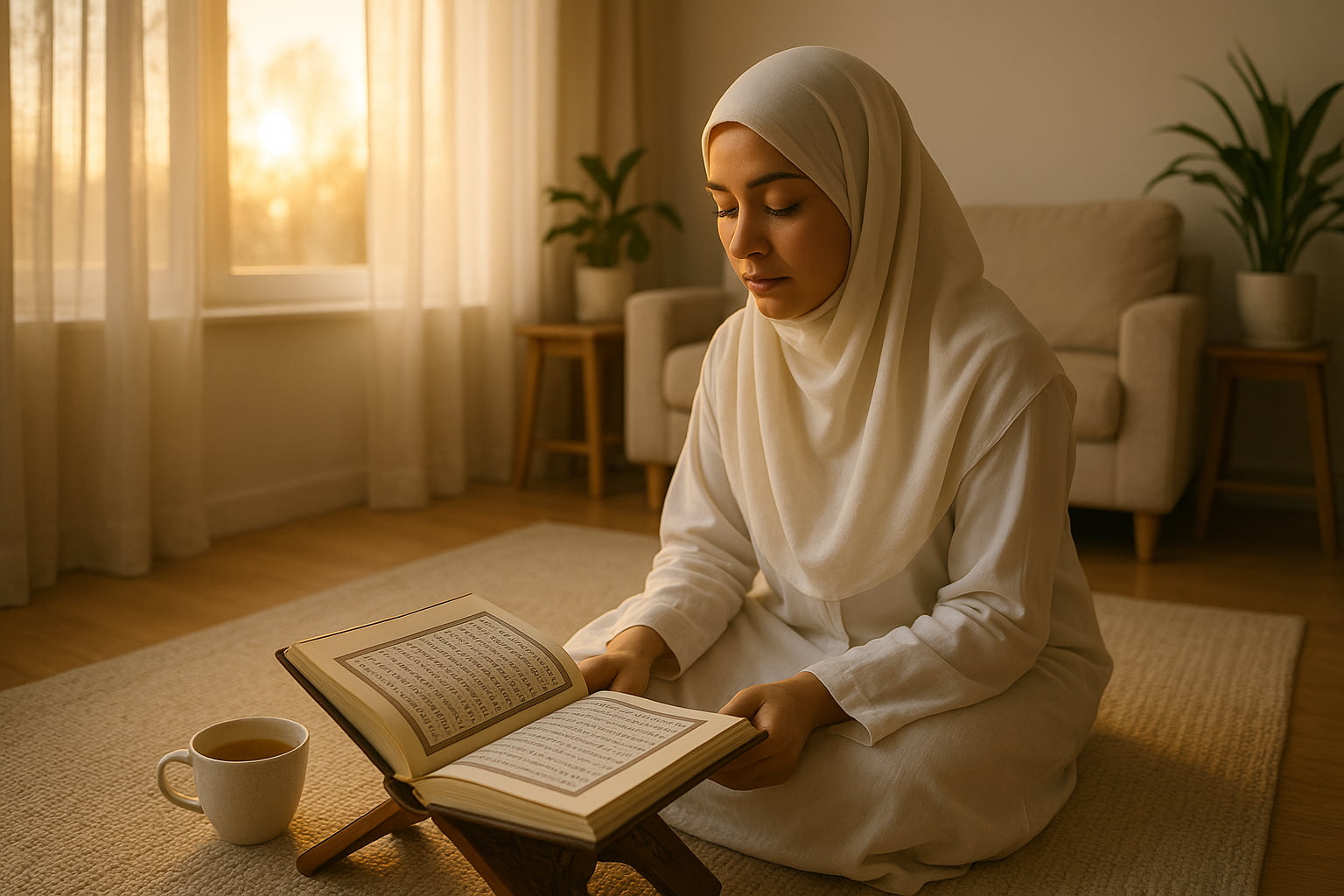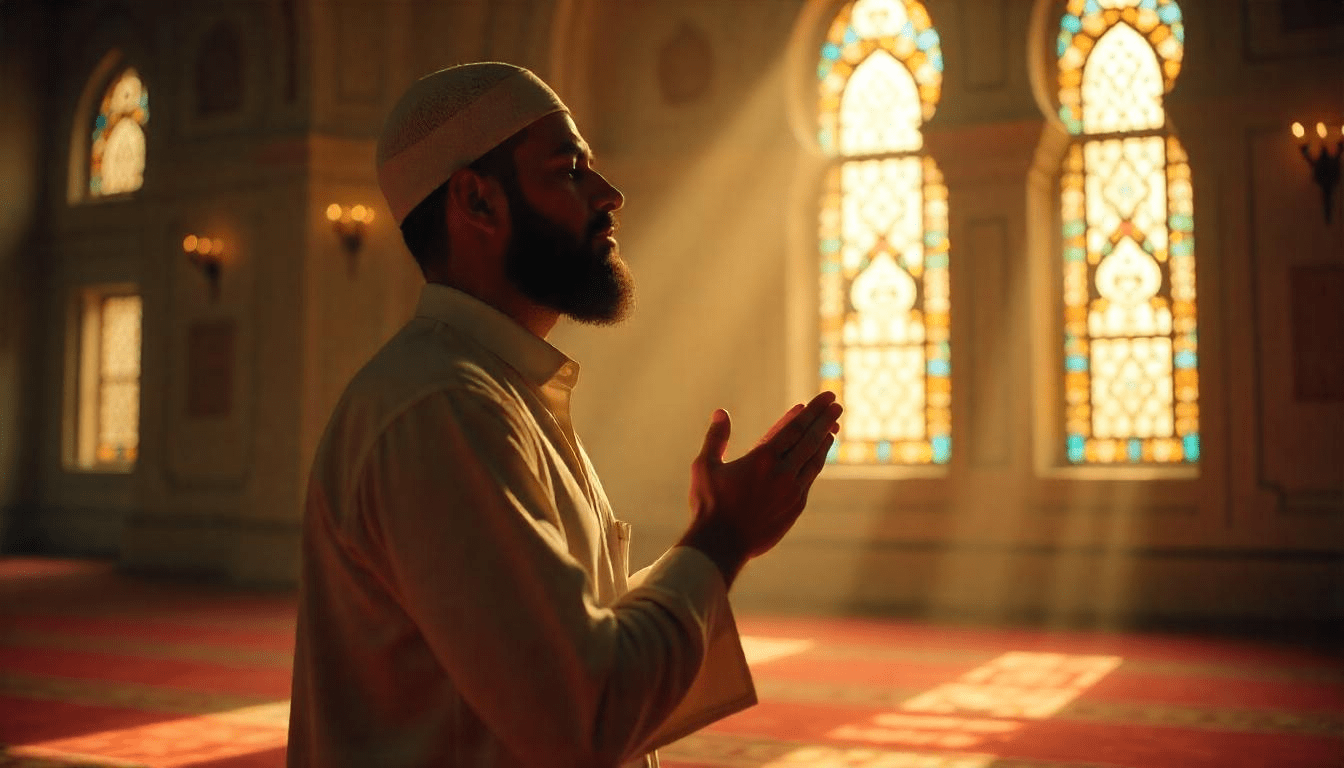In Islam, marriage is not just a contract; it’s a sacred bond built on love, mercy, and trust. A Happy Muslim Marriage is the foundation of a stable Islamic society and the key to spiritual and emotional well-being for both spouses. Understanding the core principles that guide a successful Islamic marriage can lead to long-lasting peace and happiness between husband and wife.
Principle 1: Mutual Love and Mercy (مودة ورحمة)
A cornerstone of a Happy Muslim Marriage is the presence of mawaddah (love) and rahmah (mercy) between husband and wife. This divine pairing is beautifully described in the Qur’an.
Qur’anic Verse:
وَمِنْ آيَاتِهِ أَنْ خَلَقَ لَكُم مِّنْ أَنفُسِكُمْ أَزْوَاجًۭا لِّتَسْكُنُوٓا إِلَيْهَا وَجَعَلَ بَيْنَكُم مَّوَدَّةًۭ وَرَحْمَةً
“And among His signs is this: that He created for you spouses from among yourselves so that you may find tranquility in them, and He placed between you love and mercy.”
— Surah Ar-Rum 30:21
Explanation:
- Mawaddah: Emotional connection, kindness, and affection
- Rahmah: Forgiveness, understanding, and patience
- A Happy Muslim Marriage thrives when both are practiced consistently.
Hadith:
The Prophet ﷺ said:
“The best of you is the one who is best to his wife.”
— [Tirmidhi, 3895]
This teaches that love and mercy should not be passive feelings but active actions shown daily through words and behavior.
Principle 2: Justice and Fair Treatment
Another pillar of a Happy Muslim Marriage is treating your spouse with fairness in all matters—emotional, financial, and personal.
Qur’anic Verse:
فَإِن كَرِهْتُمُوهُنَّ فَعَسَىٰٓ أَن تَكْرَهُوا۟ شَيْـًۭٔا وَيَجْعَلَ ٱللَّهُ فِيهِ خَيْرًۭا كَثِيرًۭا
“If you dislike them, it may be that you dislike something in which Allah has placed much good.”
— Surah An-Nisa 4:19
Explanation:
- Justice means not letting personal mood affect how you treat your spouse.
- Financial fairness: providing for the wife’s needs sincerely.
- Emotional fairness: not favoring one spouse over another (in the case of multiple marriages).
Hadith:
The Prophet ﷺ said:
“Every one of you is a shepherd, and every one of you is responsible for his flock…”
— [Bukhari and Muslim]
A Happy Muslim Marriage requires that each spouse fulfill their role with fairness and responsibility.
Principle 3: Open and Honest Communication
Islam encourages open and respectful dialogue between spouses. A Happy Muslim Marriage cannot survive without truthful and clear communication.
Qur’anic Verse:
يَـٰٓأَيُّهَا ٱلَّذِينَ ءَامَنُوا۟ ٱتَّقُوا۟ ٱللَّهَ وَقُولُوا۟ قَوْلًۭا سَدِيدًۭا
“O you who have believed, fear Allah and speak words of appropriate justice.”
— Surah Al-Ahzab 33:70
Explanation:
- Communication must be respectful, even during disagreements.
- Avoid yelling, sarcasm, or passive-aggressive behavior.
- Frequent and sincere communication strengthens trust.
Hadith:
The Prophet ﷺ said:
“The most perfect believers in faith are those best in character, and the best of you are those who are best to their women.”
— [Tirmidhi, 1162]
A Happy Muslim Marriage flourishes when both partners can speak openly and listen actively.
Principle 4: Emotional and Physical Intimacy
Physical and emotional closeness is not only allowed in Islam—it is rewarded. Spouses are garments for one another, offering protection and comfort.
Qur’anic Verse:
هُنَّ لِبَاسٌۭ لَّكُمْ وَأَنتُمْ لِبَاسٌۭ لَّهُنَّ
“They are clothing for you and you are clothing for them.”
— Surah Al-Baqarah 2:187
Explanation:
- Physical intimacy strengthens emotional connection.
- Islam recognizes mutual desires and promotes lawful fulfillment.
- Emotional intimacy includes support, compliments, and emotional availability.
Hadith:
The Prophet ﷺ said:
“In your sexual intimacy, there is charity.”
The Sahabah asked, “O Messenger of Allah, is there reward for one of us when he satisfies his desire?”
He ﷺ replied: “If he were to do it unlawfully, would he not be sinful? So if he does it lawfully, he is rewarded.”
— [Muslim, 1006]
A Happy Muslim Marriage involves not just lawful intimacy, but one that is loving, considerate, and spiritually uplifting.
Principle 5: Forgiveness and Patience (Sabr)
No marriage is free from mistakes or conflict. What distinguishes a Happy Muslim Marriage is the couple’s ability to forgive and show patience during trials.
Qur’anic Verse:
وَلَمَن صَبَرَ وَغَفَرَ إِنَّ ذَٰلِكَ لَمِنْ عَزْمِ ٱلْأُمُورِ
“And whoever is patient and forgives — indeed, that is of the matters requiring determination.”
— Surah Ash-Shura 42:43
Explanation:
- Never expect perfection from your spouse.
- Learn to let go of small mistakes.
- Use harsh moments as tests from Allah to improve yourself.
Hadith:
The Prophet ﷺ said:
“A believing man should not hate a believing woman. If he dislikes one of her traits, he will be pleased with another.”
— [Muslim, 1469]
This principle teaches us that a Happy Muslim Marriage is not free of problems—but full of patience and emotional strength to overcome them.
Balancing Deen and Dunya in a Happy Muslim Marriage
A Happy Muslim Marriage does not mean a life free from challenges—it means striving together for Allah’s pleasure in both spiritual and worldly matters. When husband and wife walk the path of Islam hand in hand, their bond strengthens in both this life and the Hereafter.
Spiritual Partnership
- Pray together regularly, especially Tahajjud, Fajr, and Du‘a.
- Remind each other of Islamic duties kindly.
- Encourage Qur’an reading, charity, and modesty.
A Happy Muslim Marriage grows when both partners uplift each other in faith and character.
Supporting Each Other in Worldly Needs
- Share financial burdens when necessary.
- Help with household tasks and child-rearing.
- Understand work pressures and emotional stress.
The Prophet ﷺ helped in household chores and said,
“The best of you are those who are best to their families.”
— [Ibn Majah, 1977]
This shows that mutual support is not a modern concept—it’s Sunnah.
Raising Children Together with Islamic Values
When a couple has children, their marriage gains a new dimension. A Happy Muslim Marriage includes shared responsibility in nurturing righteous children.
Joint Parenting in Islam
- Fathers provide, protect, and lead spiritually.
- Mothers nurture, educate, and support emotionally.
- Both must cooperate to provide Islamic education, discipline, and love.
وَأْمُرْ أَهْلَكَ بِٱلصَّلَوٰةِ وَٱصْطَبِرْ عَلَيْهَا
“And enjoin prayer upon your family and be steadfast therein.”
— Surah Taha 20:132
Raising children is not just about physical care—it’s about building an Islamic environment at home.
Conflict Resolution in a Happy Muslim Marriage
Even in the most blessed marriages, disagreements happen. What defines a Happy Muslim Marriage is how these conflicts are handled—with wisdom, patience, and without ego.
Islamic Tools for Peaceful Resolution
- Silence in moments of anger is Sunnah.
- Forgive quickly before going to sleep.
- Seek mediation through family or scholars if needed.
The Prophet ﷺ said:
“Whoever suppresses his anger when he is able to act upon it, Allah will fill his heart with satisfaction on the Day of Judgment.”
— [Tabarani]
A Happy Muslim Marriage doesn’t ignore problems—it solves them with Islamic manners.
Daily Sunnah Practices to Strengthen Marriage
Islam provides daily habits that directly strengthen love and mercy between spouses, forming the bedrock of a Happy Muslim Marriage.
Daily Sunnahs to Practice:
- Greet each other with Assalamu Alaikum
- Smile when you see each other
- Praise and compliment your spouse often
- Share food from the same plate
- Make du‘a for your spouse after each salah
The Prophet ﷺ said:
“When a man feeds his wife, it is charity.”
— [Bukhari and Muslim]
These small Sunnahs add up, making everyday life feel sacred and beautiful.
Role of Gratitude in a Happy Muslim Marriage
Thankfulness in Islam is a powerful tool for maintaining peace and increasing blessings. A Happy Muslim Marriage requires both partners to show gratitude—for the big things and the small.
Qur’anic Principle:
لَئِن شَكَرْتُمْ لَأَزِيدَنَّكُمْ
“If you are grateful, I will surely increase you [in favor].”
— Surah Ibrahim 14:7
How to Show Gratitude in Marriage:
- Thank your spouse regularly
- Acknowledge their sacrifices
- Don’t compare your marriage to others
- Appreciate efforts even if the results are not perfect
Gratitude turns hardship into ease, and brings barakah into a Happy Muslim Marriage.
Maintaining Romance in a Halal Way
Islam does not discourage romance; in fact, it encourages love and affection between spouses. A Happy Muslim Marriage is full of warmth, intimacy, and emotional connection—expressed in a halal, respectful manner.
Halal Ways to Express Love:
- Surprise gifts
- Loving nicknames
- Private walks or outings
- Notes, texts, and duas
- Physical affection with intention of ibadah
Aisha (RA) said:
“The Prophet ﷺ used to drink from the same cup I drank from, placing his lips where mine had been.”
— [Muslim]
Such beautiful expressions of love make the foundation of a truly Happy Muslim Marriage.
Guarding the Marriage from External Harm
One major threat to a Happy Muslim Marriage is the influence of outside forces—social media, inappropriate friendships, family interference, or bad advice.
Islamic Protection Plan:
- Keep private matters private
- Avoid involving friends in personal disputes
- Limit social media time and usage
- Lower the gaze and observe modesty
- Maintain regular du‘a for protection of your home
وَقُل رَّبِّ أَعُوذُ بِكَ مِنْ هَمَزَٰتِ ٱلشَّيَـٰطِينِ
“And say, ‘My Lord, I seek refuge in You from the evil whispers of the devils.'”
— Surah Al-Mu’minun 23:97
A Happy Muslim Marriage is not just about what happens between the spouses, but also how they shield their marriage from destructive outside influences.
Managing Expectations in a Happy Muslim Marriage
Unrealistic or unspoken expectations often become silent destroyers of peace in a relationship. A Happy Muslim Marriage is built on clarity, acceptance, and alignment of mutual goals, rather than worldly perfection.
Common Areas of Conflict:
- Financial lifestyle or spending habits
- Division of chores and responsibilities
- Parenting roles and education priorities
- In-laws and family boundaries
Islamic Mindset for Managing Expectations:
عَسَىٰٓ أَن تَكْرَهُوا۟ شَيْـًۭٔا وَهُوَ خَيْرٌۭ لَّكُمْ
“It may be that you dislike a thing which is good for you.”
— Surah Al-Baqarah 2:216
In a Happy Muslim Marriage, spouses learn to balance contentment with effort. Instead of demanding perfection, they practice shukr (gratitude) and sabr (patience), adjusting expectations while still working to improve each other lovingly.
Giving Time and Presence: A Sunnah Practice
In our modern world, couples are often “together” but disconnected—each on their phone, absorbed in work, or emotionally distant. A Happy Muslim Marriage requires intentional time together and true presence.
Practical Sunnah-Based Solutions:
- Eat meals together without distractions
- Talk before sleep—share reflections or du‘as
- Take walks or short outings, even locally
- Recite Qur’an together or listen to a lecture
- Set aside one night a week as “spouse time”
Aisha (RA) said:
“The Prophet ﷺ would converse with me and listen attentively.”
The Prophet ﷺ gave emotional presence to his wives, showing us that a Happy Muslim Marriage includes simple but consistent attention.
The Role of Dua in Strengthening the Marriage Bond
No matter how much effort is made, the heart’s direction and harmony come from Allah alone. That’s why regular du‘a is essential for a Happy Muslim Marriage.
Du’as to Read Together or for Each Other:
رَبَّنَا هَبْ لَنَا مِنْ أَزْوَاجِنَا وَذُرِّيَّاتِنَا قُرَّةَ أَعْيُنٍۢ وَاجْعَلْنَا لِلْمُتَّقِينَ إِمَامًا
“Our Lord, grant us from among our wives and offspring comfort to our eyes and make us an example for the righteous.”
— Surah Al-Furqan 25:74
اللَّهُمَّ أَلِّفْ بَيْنَ قُلُوبِنَا وَأَصْلِحْ ذَاتَ بَيْنِنَا
“O Allah, bring our hearts together and reconcile between us.”
In every stage—beginning, hardship, joy—du‘a renews the soul of a Happy Muslim Marriage.
Giving and Receiving Advice Gently
Spouses are not just partners but each other’s mirrors. Giving advice is necessary, but how it is delivered affects whether it heals or harms.
Sunnah Style of Advising:
- Choose the right time
- Speak in private
- Begin with praise, not criticism
- Keep the tone soft
- Use phrases like, “May Allah guide us both…” or “Let’s try this together…”
وَقُولُوا۟ لِلنَّاسِ حُسْنًۭا
“Speak kindly to people.”
— Surah Al-Baqarah 2:83
A Happy Muslim Marriage corrects without hurting, advises without arrogance, and listens without reacting emotionally.
Celebrating Each Other’s Efforts and Milestones
A Happy Muslim Marriage doesn’t only focus on what’s wrong—it celebrates what’s good. Recognizing your spouse’s efforts strengthens love and motivates goodness.
Islamic Encouragement to Acknowledge Good:
The Prophet ﷺ said:
“He who does not thank people has not thanked Allah.”
— [Abu Dawood, 4811]
Ways to Celebrate Each Other:
- Say JazakAllah Khair often
- Gift something even if small
- Praise their effort in front of children
- Celebrate anniversaries or life events with du‘a and reflection
- Share success as a team
In a Happy Muslim Marriage, joy is shared and gratitude is vocalized—not assumed.
Learning Together: Building an Islamic Legacy
Spiritual growth together is a powerful engine for marital harmony. A Happy Muslim Marriage is not just about companionship in this world, but preparing together for Akhirah (the hereafter).
Simple Ways to Learn Together:
- Read Tafsir or Hadith books at night
- Watch beneficial Islamic talks as a couple
- Attend Jummah or local classes together
- Set Islamic family goals: charity, dhikr, sadaqah
وَتَعَاوَنُوا۟ عَلَى ٱلْبِرِّ وَٱلتَّقْوَىٰ
“And help one another in righteousness and piety.”
— Surah Al-Ma’idah 5:2
The more you invest in learning together, the stronger and deeper your Happy Muslim Marriage becomes.
Frequently Asked Questions
Q1: What are the 5 pillars of marriage in Islam?
While the five pillars of Islam are foundational to faith, a Happy Muslim Marriage is also built on its own key principles, which include:
- Mawaddah (Love)
- Rahmah (Mercy)
- Adl (Justice and Fairness)
- Sabr (Patience)
- Shura (Mutual Consultation and Communication)
These values, practiced consistently, help ensure a blessed and fulfilling marital life in accordance with Islamic teachings.
Q2: What are the 5 principles of Islam?
The five principles (pillars) of Islam are:
- Shahadah (Testimony of faith)
- Salah (Prayer)
- Zakah (Charity)
- Sawm (Fasting in Ramadan)
- Hajj (Pilgrimage to Makkah)
While these pillars guide spiritual life, they also indirectly contribute to a Happy Muslim Marriage by strengthening taqwa, patience, and discipline in both spouses.
Q3: How to be happy in marriage in Islam?
To maintain a Happy Muslim Marriage, Islam advises couples to:
- Show mutual love and mercy
- Be patient and forgiving
- Communicate with honesty and kindness
- Support each other in deen and dunya
- Avoid unnecessary arguments and always make du‘a
Following the Qur’an and Sunnah brings barakah (blessings) into married life and preserves emotional harmony.
Q4: What are the essentials of marriage in Islam?
The basic Islamic requirements for a valid marriage include:
- Proposal and acceptance (Ijab & Qubool)
- Mahr (dower)
- Two witnesses
- Guardian (wali) for the bride
Beyond legality, the essentials of a Happy Muslim Marriage also involve love, commitment, emotional support, and righteous companionship.
Q5: What is the secret of happy marriage in Islam?
The secret to a Happy Muslim Marriage lies in:
- Putting Allah at the center of the relationship
- Practicing daily Sunnah in interactions
- Resolving conflicts with patience and prayer
- Showing gratitude and affection regularly
- Seeking knowledge together and growing in faith
A marriage focused on pleasing Allah brings both emotional satisfaction and spiritual elevation.

